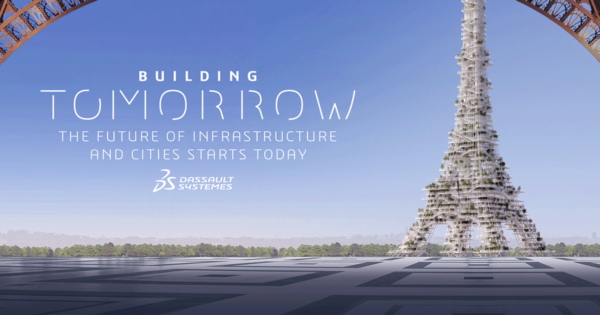The Eiffel Tower is one of the world’s most famous monuments, but when it was constructed between 1887 and 1889, it was controversial and unpopular. Critics from the art world called the tower ugly and useless, and some worried it would collapse.
If the glittering landmark of Paris were being built today, how might it be received? For one, many people would likely expect it to be sustainable and environmentally responsible as concerns grow over the impact of climate change on cities.
A new project from French software company Dassault Systèmes reimagines the Eiffel Tower to call for more sustainable design and building practices. The “Building Tomorrow” campaign, created by agency Wunderman Thompson France, envisions a new version of Gustave Eiffel’s iconic building if it were constructed with modern technology that benefited the planet.
The updated design is a low-carbon, circular and regenerative tower that addresses many of the challenges resulting from the rapid growth of cities, such as greenhouse gas emissions, energy consumption and quality of life.

The new Eiffel Tower is just virtual, but the model demonstrates the possibilities of sustainable urban development. It pushes for industrywide change and aims to motivate public authorities, engineers, architects and builders to reconsider how they design buildings and cities.
An accompanying six-part documentary series chronicles how the tower was reimagined using Dassault Systèmes’ 3DExperience platform, which allows designers to work on a virtual representation of a product or project and test it before building in the real world. Vincent Druguet, CEO of Wunderman Thompson France, said the most impactful way to demonstrate how the platform works was to use the example of one of the world’s most recognizable landmarks.
“We want to provide solutions that are going to empower our ecosystem of innovators to build a more sustainable future,” Florence Verzelen, Dassault Systèmes’ executive vice president of industry, marketing and sustainability, said in a statement. “We only have until 2030 to significantly reduce our way of innovating, creating and life-cycling our assets, or we won’t be able to give our children a livable planet.”
This project is one example of how many industries are rethinking their practices as consumers grow increasingly focused on sustainability. NielsenIQ’s 2023 Sustainability Report shows that 42% of respondents consider the sustainability or environmentally friendly claims of a product to be “much more important” than two years ago.
CREDITS:
Brand: Dassault Systèmes
Executive vice president industry, marketing & sustainability: Florence Verzelen
Global senior marketing director: Olivier Suire
Content strategy & production director: Vanessa Bellaiche
Content strategy & production account manager: Céline Dantzer-Delfino
Agency: Wunderman Thompson France
CEO: Vincent Druguet
Strategic planning: Lionel Gomez
Creative directors: Adrien Mancel, Paul-Émile Raymond
Art director: Florence Vignon
Head of editorial: Sylvain Pausz
Copywriters: Thomas Blanc, Eddie Ansell, Rhys Maliphant
Motion designer: Clément Lovera
Account director: Vincent Jégu
Project management: Romane Frisquet, Smilla Balletto, Yael Genossar, Thomas Roujou de Boubée, Vincent Jégu
Production company: Ray Production
Senior integrated producer: Valérie Montiel
Junior integrated producer: Sara Denis
Production company: Gang Life – Paris
Director: Laurent Follea
DOP: Brian Camusat
Executive producer: Dimitri Grimblat
Post production: Bande A Part – Paris
Editor: Lucas Martin Delaunay
Composer: Geoffroy Berlioz
Animation company: L’Autre Image – Paris
Source link




